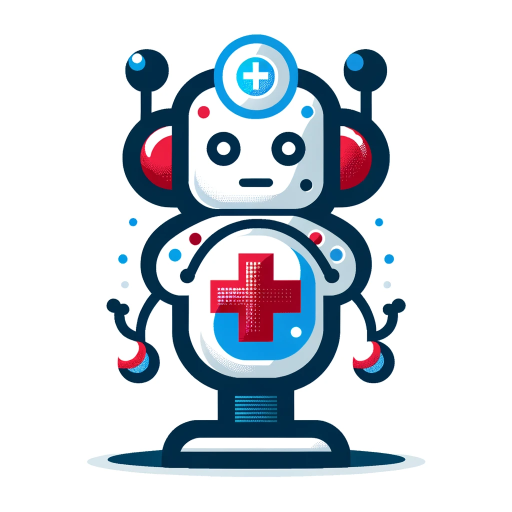HemOnc Assistant-AI-powered Hematology-Oncology resource
AI-powered tool for Hematology-Oncology knowledge
Find the latest guidelines on acute lymphoblastic leukemia.
Explain the mechanism of action of rituximab.
Summarize recent findings on multiple myeloma treatments.
What are the current best practices for managing anemia in cancer patients?
Related Tools
Load More
Medi Assistant
Professional aid in family medicine, focusing on medical accuracy and conciseness.

MedAssist
Pioneering personalized healthcare through AI: From diagnosis to tailored treatments, we're transforming care for every unique journey with adaptive algorithms. Revolutionizing well-being, one algorithm at a time.

Medical Assistant
GPT for medical advice based on your symptoms

Nursing Student Helper
Assists nursing students with concise explanations on topics and ADPIE steps.

Medi Assistant
Formal, doctor-like assistant for healthcare providers.

Med Assist
Medical assistant for GPs in New Zealand
20.0 / 5 (200 votes)
Introduction to HemOnc Assistant
HemOnc Assistant is an AI-driven tool designed to assist hematology-oncology fellows and medical professionals by providing detailed, reliable information related to hematology and oncology. The platform draws from reputable sources like NCCN, ASCO, ESMO, and ASH guidelines to offer scientifically accurate, up-to-date knowledge on various hematologic and solid malignancies. The core function of HemOnc Assistant is to support knowledge acquisition, clarification, and exploration of complex topics in hematology and oncology, enabling professionals to access tailored, technical, and high-level content rapidly. For example, if a fellow is studying therapeutic options for Diffuse Large B-Cell Lymphoma (DLBCL), HemOnc Assistant can provide NCCN-guided treatment pathways, cite recent clinical trials, and explain novel therapies like CAR-T cell therapy. Similarly, a user can explore specific genetic mutations like FLT3-ITD in AML, querying for targeted therapies and their mechanisms of action.

Key Functions of HemOnc Assistant
Guideline Consultation and Updates
Example
A fellow needs to quickly reference the latest treatment algorithm for non-small cell lung cancer (NSCLC) as outlined in NCCN guidelines, including targeted therapies for EGFR and ALK mutations.
Scenario
HemOnc Assistant can provide detailed summaries and updates of the most recent guidelines, helping the fellow stay current with standards of care and integrating new therapeutic options such as immunotherapies (e.g., PD-1/PD-L1 inhibitors).
Mechanism of Action Clarifications
Example
A clinician is exploring how PARP inhibitors work in BRCA-mutated ovarian cancer and wants a concise explanation of the molecular pathways.
Scenario
HemOnc Assistant can offer a thorough breakdown of the mechanism, explaining how PARP inhibitors exploit synthetic lethality by preventing DNA repair in cancer cells with BRCA mutations, contributing to cell death.
Clinical Trial Summaries and Data
Example
A researcher is evaluating the outcomes of a recent trial (e.g., CheckMate 227) involving combination immunotherapy in lung cancer and wants key results.
Scenario
HemOnc Assistant can extract relevant clinical trial data, summarizing patient cohorts, study design, response rates, progression-free survival (PFS), overall survival (OS), and toxicity profiles, helping the researcher integrate these findings into clinical decision-making.
Target User Groups for HemOnc Assistant
Hematology-Oncology Fellows
This group benefits the most as HemOnc Assistant helps them acquire, clarify, and organize complex information during their training. Fellows use the platform for quick access to guidelines, deep-diving into mechanisms of action, and understanding new treatment options. For example, while rotating through clinical services, they can use HemOnc Assistant to review the latest recommendations for Hodgkin lymphoma staging or to explore molecular-targeted therapies in chronic myeloid leukemia (CML).
Attending Physicians and Researchers
Experienced oncologists and hematologists, as well as clinical researchers, use HemOnc Assistant to stay up-to-date with evolving treatments and trial data. For example, an attending physician might rely on the assistant to explore new FDA approvals for therapies like bispecific antibodies in multiple myeloma, while a researcher might use it to assess data from a novel immunotherapy trial in melanoma.

Guidelines for Using HemOnc Assistant
Step 1
Visit aichatonline.org for a free trial without login, no need for ChatGPT Plus.
Step 2
Ensure you have a stable internet connection to interact with the platform seamlessly. This tool works on any browser without the need for additional software.
Step 3
Explore use cases like research on hematological or oncological conditions, guideline consultations (e.g., NCCN, ASH), or detailed cancer-related queries.
Step 4
Ask complex medical questions by providing clear and specific details to get tailored, evidence-based responses, supported by clinical guidelines and research.
Step 5
Use HemOnc Assistant to cross-reference studies, aid in decision-making, or gather in-depth knowledge for presentations and publications.
Try other advanced and practical GPTs
AI for Medical Students
AI-powered learning for future doctors

中医养生助手Chinese Medicine Health Assistant
AI-powered Chinese medicine health assessment tool

Financial Statement Analysis Assistant
AI-Powered Financial Insights

Medical Coding AI
Accurate Medical Coding Powered by AI

Route Planner
AI-powered travel route solutions

Your GTM Expert - Master the Growth
AI-powered GTM guidance for all.

Market Analyst by Mojju
AI-powered market analysis for smarter trading.

Discount Code Generator
AI-powered savings for your purchases

Acquisition Criteria Creator
AI-powered business acquisition criteria tool

GPT News
AI-powered News and Insights

Navy Block 43 Writer
AI-powered Navy Evaluations Simplified

Asistente de Cocina
AI-Powered Culinary Guidance for All

- Exam Preparation
- Medical Education
- Clinical Research
- Literature Search
- Guideline Review
Common Questions about HemOnc Assistant
What kind of medical topics can HemOnc Assistant cover?
HemOnc Assistant specializes in Hematology-Oncology topics, including hematologic malignancies, solid tumors, clinical trials, diagnostic criteria, treatment protocols, and evidence-based guidelines from major organizations like ASCO, NCCN, and ESMO.
Can HemOnc Assistant provide references to guidelines or research papers?
Yes, HemOnc Assistant sources information from credible medical guidelines such as ASCO, NCCN, ESMO, and top-tier journals, helping users find the latest standards of care and scientific research.
Is HemOnc Assistant suitable for clinical decision support?
While HemOnc Assistant provides in-depth information and references to the latest guidelines, it is not designed to replace clinical judgment or provide direct medical advice. It should be used to support knowledge and research.
How can HemOnc Assistant help with academic writing?
HemOnc Assistant can assist with literature searches, summarizing complex research findings, suggesting sources, and offering insights into the latest oncology and hematology advancements, all while providing appropriate citations.
Can HemOnc Assistant be used for preparing for board exams?
Yes, HemOnc Assistant can help users review up-to-date information on treatment guidelines, disease mechanisms, and diagnostic approaches, making it a valuable tool for exam preparation in Hematology-Oncology.